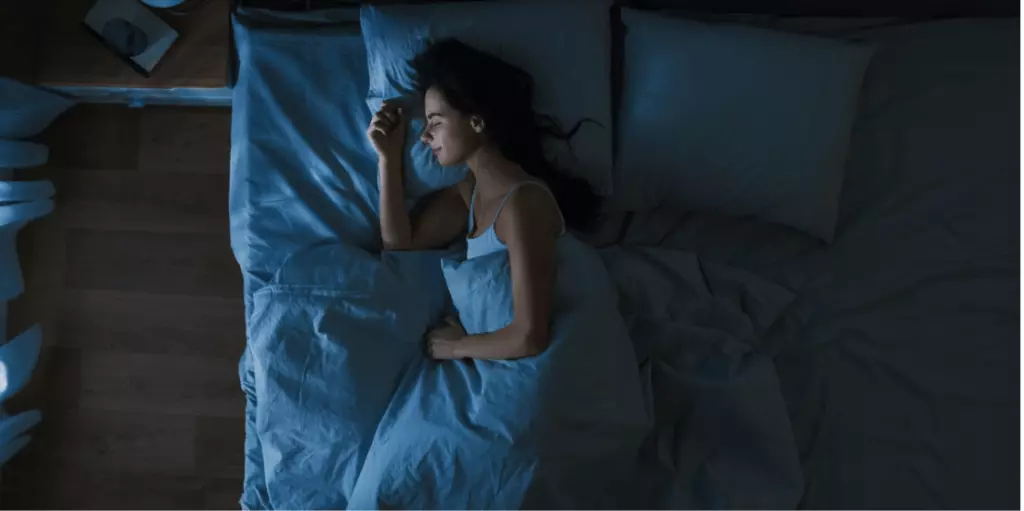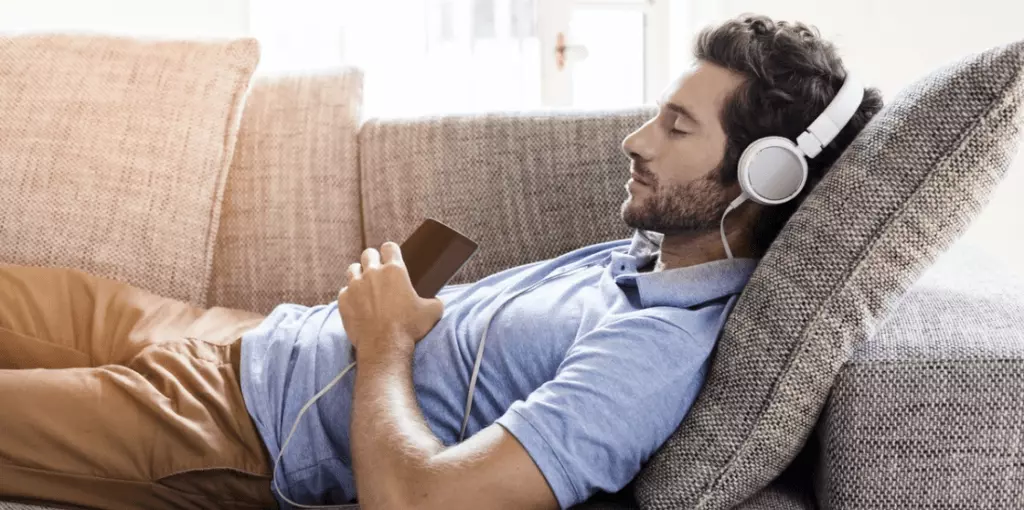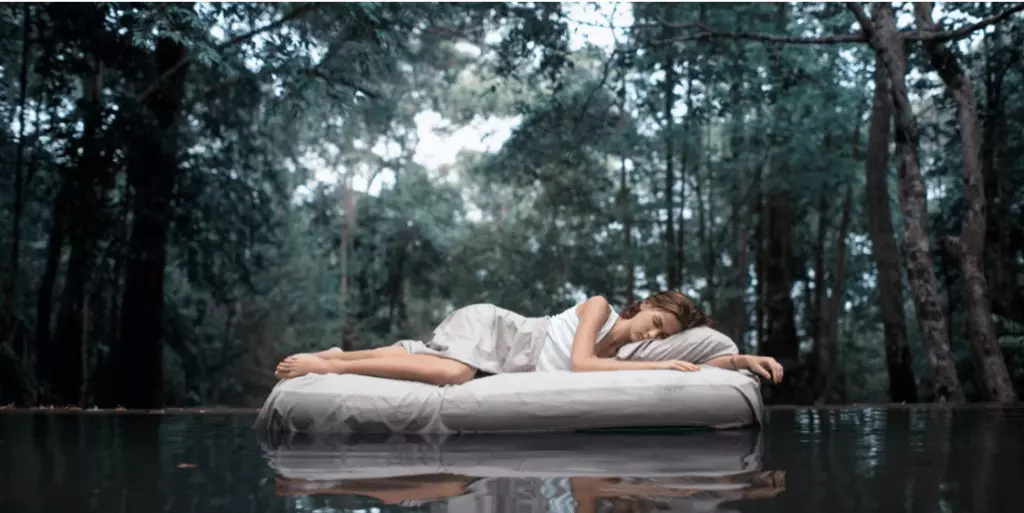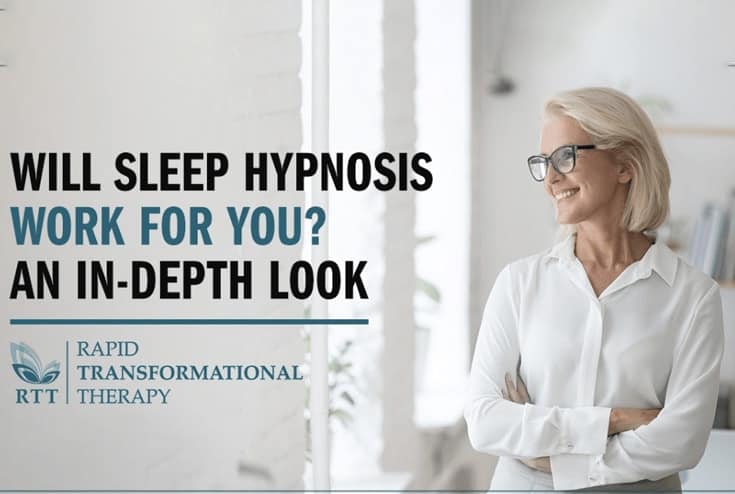Are you curious about how sleep hypnosis works? Have you thought about trying a session, but are not sure what to expect? Or maybe you tried sleep aids and found they do not work for you long-term?
Over the course of our lives, our sleep patterns can change. Sleeping soundly should be an enjoyable and very natural process. However, sometimes it can be difficult to go to sleep and stay asleep. That is where the concept of hypnosis comes into play. If you have difficulties with sleep, hypnosis can help you in more ways than you could begin to imagine.
Sleeping difficulties, whether trouble falling asleep or staying asleep, can color your entire life. We all have times where we cannot sleep because we have too much on our minds. Hypnosis can let go of stress and anxiety, and help you get a good night’s sleep.
In this article, we will review:
- What sleep hypnosis is
- How it works for improving the quality of sleep
- What a guided sleep session is like
- A self-guided practice you can use today to relax your mind and body and get restful sleep
Read on to learn everything you need to know about sleep hypnosis.
What is Sleep Hypnosis?

Sleep hypnosis is a process where you relax into a hypnotic trance to train your brain on how to fall asleep easier and stay asleep longer. This might take place in a one-on-one session with a hypnotherapist, by listening to a recording, or doing a self-guided practice.
Sleep hypnosis is no different than using hypnosis to lose weight or stop smoking. When you relax into a trance, your mind is highly suggestible. This is when you can influence it by providing positive empowering suggestions that can shift your beliefs and behaviors. In addition, hypnosis is a process that is relaxing and soothing all by itself.
Many therapeutic modalities might be used as part of a hypnosis session to help you sleep including guided imagery, progressive relaxation, breathing exercises or even metaphors or storytelling.
How hypnosis can help with sleep issues
According to a study conducted by Hossain JL, Shapiro CM., about 35-40% of the adult population in the United States alone suffers from some kind of sleep disturbance that has major social and economic consequences.
When you do not get enough sleep, you pay the price. You may feel extremely sleepy during the day, or suffer from a lack of concentration and focus, which might cause you to perform your job poorly.
A lack of sleep can also play a significant role in accidents, causing people’s attention to wander off.
When you fail to get that restorative night’s sleep you will eventually start accumulating a sleep debt, which is not easily repaid.
Sleeplessness can lead to:
- Moodiness and irritability.
- Depressed mood and lack of motivation.
- Inability to concentrate and forgetfulness.
- Clumsiness and learning difficulties.
- Increased appetite and reduced sex drive.
Sleep problems may also be an indicator of future health problems, including cardiovascular disease, mental health issues, and even dementia, according to multiple studies.

Research shows that hypnosis is a highly regarded therapeutic tool for sleep.
Although more studies may be needed, there is some scientific evidence that hypnosis has a positive effect when it comes to using it as a therapeutic intervention for sleep.
According to Dr. Brian Weiss, hypnosis can help you calm an overactive mind by helping you enter a relaxed state of focused concentration.
This state of relaxed concentration is perfectly normal and accessed often throughout the day every time you get lost in thought or ‘zone out’. Hypnosis simply helps you activate that state much more quickly.
According to a Swiss study, a short session of hypnosis might lead to a better night’s sleep. Bjorn Rasch, a professor with the department of psychology at the University of Fribourg in Switzerland also states that there have been many studies reporting that hypnosis can be a good thing for promoting sleep.
This particular study monitored brainwave activity during sleep patterns. The results speak for themselves.
Women who were highly suggestible and listened to an audiotape containing hypnotic suggestions slept 67% more than the control group. They also enjoyed an 80% improvement in deep sleep following hypnosis.
In the journal article, Hypnosis Intervention Effects on Sleep Outcomes: A Systematic Review, research revealed hypnosis to be a cost-effective and safe intervention with reported benefits for multiple health conditions.
Overall, 58.3% of the reviewed studies reported the benefits of using hypnosis for sleep. As a result, we can see that hypnosis is a promising treatment modality that certainly merits further investigation.
Hypnosis VS Sleep Aids

The amount of time we spend sleeping declines as we age. Sleep patterns also change with age. Beyond the age of 11 or 12, sleep disturbances become even more noticeable.
According to Harvard University, nearly 7 out of every 10 adults experience some kind of problem that affects the quality of their sleep.
As we age, insomnia and sleep disruptions can also be a common side effect of many types of medical conditions such as arthritis, congestive heart failure, and even depression.
As a result of this, many people turn to sleep aids, but how healthy are they long-term?
How do sleep aids work?
According to Harvard Health, sleep medications have pros and cons. While they may provide a quick fix, they can also cause long-term side effects.
Side effects of various sleeping products may cause issues such as dizziness, headaches, memory loss, hallucinations, stomach issues, or even a burning sensation.
There may also be risks associated with overdose or taking too many for too long. In addition, some people might also experience allergic reactions such as blurry vision, chest pain, swelling or even difficulty breathing, amongst other symptoms.
Even natural products like melatonin come with risks of long-term effects. While many sleeping pills are considered safe, they still have side-effects which can be damaging.
According to the Mayo Clinic, sleeping pills may be helpful for things like travel disruptions or stress. However, for those with ongoing or long-term insomnia, other treatment modalities such as behavioral therapy may be a better choice.
That is also one of the reasons why hypnosis is such a good choice. Habitual use of sleep aids can make you overly reliant on them, and they might even cause you health consequences down the road.
How does sleep hypnosis work?

According to Steven B. Reed, a therapist, and counselor, many illnesses have psychological components. Moreover, according to the American Medical Association, up to two-thirds of visits to doctors are because of stress-related symptoms. Stress can also be one of the major causes of sleep issues.
In the modern world, stress became an inevitable part of our everyday life and it can be unsustainable to use sleep aids on a regular basis because of its side effects and the potential of developing a dependency.
So how does hypnosis for sleep work?
First of all, contrary to sleep aids, hypnosis doesn’t have any side effects. It also doesn’t cause dependencies. This is why it can be a sustainable solution for many.
Hypnosis works on multiple levels influencing the mind and the body. It can harness the power of the mind to bring healing to the body. Hypnosis helps your mind and body relax and by using it on a regular basis you can learn to let the stress go and facilitate the healing process naturally.
Hypnosis, however, can be much more than a helpful tool you can use to relax your mind and body after a stressful day. With hypnosis, you can go one step deeper as it can help you reprogram your mind and bring desired lasting behavioral and lifestyle changes.
Sleep hypnosis is designed to work with the subconscious mind, helping you access that calm and relaxed alpha brainwave state where you are more suggestible.
When you relax into the alpha brainwave state, your subconscious mind comes to the forefront, and by providing positive empowering suggestions, you are able to make changes faster.
The subconscious mind doesn’t know the difference between imagination and reality. In the trance state of relaxation you experience under hypnosis, your subconscious mind becomes very suggestible. This is why every word the therapist is saying will have a much larger impact on changing your future thought patterns and behaviors. You can reprogram your mind to be more mindful about your states during the day and take small steps like deep breathing to relax and avoid the accumulation of stress.
The best part – you don’t have to exercise your willpower to make those changes. With hypnosis, you are able to adopt desirable beliefs and behaviors imprinting it into your subconscious mind directly, so your automatic behaviors change.
What is a guided sleep session like?

It is best to have your first hypnotic session with a certified hypnotherapist. They will be able to assist you in creating sessions tailored to your specific needs and goals.
Another option you have is to try a pre-recorded sleep hypnosis session done by a trusted professional such as Marisa Peer, a world-renowned speaker, therapist, and bestselling author. With over three decades of experience in the field of hypnotherapy, Marisa Peer is the creator of a modern therapeutic modality called Rapid Transformational Hypnotherapy® (RTT®), which helps clients make lasting changes often in only one to three sessions.
Finally, if you just want to dip your toes in working with hypnosis, you can try to lead yourself in a hypnotic state by using one of the self-hypnosis practices below.
Now, you might be wondering, what to expect in a hypnotic session and how will you know if you are becoming hypnotized if you are trying it out without a professional hypnotherapist.
What to expect from a guided hypnotic sleep session.
Typically the initial one-on-one session with a hypnotist involves a brief interview and a review of your goals. The hypnotist will also sit down with you to discuss what you are going through in life and what improvements you are trying to make. A brief medical history may also be discussed.
Once you relax into hypnosis, you will be able to tune out the world and release worries and doubts. This is why many people experience a decrease in stress and anxiety and other mental issues after going through a hypnosis session.
A guided sleep session is extremely relaxing, as are all hypnosis sessions. When you close your eyes and allow your mind to drift off, you will become very relaxed and sleepy. Once you reach that relaxed alpha brainwave state, the hypnotherapist will then begin repeating hypnotic suggestions or engaging you in whatever type of session you are focusing on.
There are many hypnotic techniques that can be used to treat sleep issues. Each technique has its own strengths and requirements. The hypnotherapist will choose the technique that is suitable for you, based on their training, in order to maximize the positive impact.
During a guided sleep session you will feel extremely relaxed and drowsy and you may even fall asleep. You may hear every word the hypnotherapist is telling you, or you may drift off and wake up, not even realizing the session is complete.
It does not matter if you consciously listen or hear the words or not because sleep hypnosis works with the subconscious mind.
Guided sleep session – a simple self-hypnosis practice

There are some quick techniques you can try at home to help you sleep, such as visualization, or taking yourself down a stairway.
Visualization for sleep
Find a quiet place to sit or lie down. Start some deep breathing or tense and relax your muscles. Let all your thoughts go by acknowledging them and then releasing them.
Now imagine a beautiful beach. See yourself walking along this beach and sinking your toes into the sand. Feel the cool water and the ocean breeze. See if you can taste the salty sea air. Listen to the sounds of the waves. Look up into the sky and notice the colors. Notice the color of the water. Step into the water, and notice how soothing the water feels.
You can imagine anything here. Use all of your senses to see, feel and be there in your mind. Allow it to look like and feel like just the way you want it to, and if it does not happen – just make it up. As Marisa Peer, one of the world’s leading trainers in advanced hypnotherapy techniques states “Your imagination is the most powerful tool you own.”
Whatever you imagine, imagine it with all your senses. Notice how warm or cold it is. Think about what it smells like. How it feels to your touch. Feel the warmth of the sunshine on your back. Listen for any sounds and notice if they are in rhythm with your breathing.
As you walk along the beach, imagine yourself getting sleepier and sleepier until you can’t walk any further.
Walking down the stairs
Relax and get comfortable and find a quiet place to sit or lie down. Uncross your arms and your legs. Continue breathing deeply until you feel your energy calming.
Begin by imagining yourself at the top of a beautiful staircase, visualizing one you may have seen at a beautiful house or a museum. Slowly count yourself down10 stairs.
Imagine with each step that you become lighter and lighter as you go deeper and deeper. You may also choose to count backward from 100-1, stopping whenever you feel a place of deep relaxation.
As you move down the stairs, feel your feet becoming softer and lighter. If you lose the intention to continue going down the stairs, you may either give yourself some positive suggestions or just relax.
Using suggestions for relaxation
Some simple phrases you can repeat in your mind to help you achieve a light state of trance include:
- The deeper I go the better I feel and the better I feel the deeper I go.
- I allow the soothing sound of my voice to calm and relax me.
- Moment by moment, my mind is becoming as clear as the surface of a calm and quiet lake.
- As I continue to breathe deeply, I become more and more relaxed, more and more at ease.
- I allow my body to become more and more relaxed with each passing moment.
- Every sound that I hear allows me to go deeper and deeper into a hypnotic trance.
- It is easy for me to relax deeply.
- Breathing deeply brings me into a deep state of relaxation.
- I am at peace.
- My body is calm and relaxed.
- I easily achieve a very deep state of relaxation.
- Each and every muscle of my body is now relaxing.
Tips for Better Sleep

Sometimes our minds can race out of control. When this happens, you may also become easily agitated. Buddha called this state of mind the ‘monkey mind’.
Using hypnosis, you can train your mind to let go of anxious thoughts so you can relax.
According to the Mayo Clinic, there are some simple tips you can follow to get a good night’s sleep:
- Stick with a consistent sleep schedule.
- Stay away from caffeine or heavy foods prior to sleep.
- Create a relaxing environment.
- Limit naps.
- Get some exercise.
- Manage your worries.
Sticking with a consistent sleep schedule is a good habit to get into. The recommended amount of sleep for a healthy adult is around 7-8 hours. Aim to go to bed at the same time every night and try not to range from that on weekends by more than one hour or so.
Paying attention to what you eat and drink can also make a big difference. Eating heavy foods or drinking caffeine late at night is obviously problematic.
If your bedroom does not provide a relaxing environment, it might be time to clean it up. We sleep best in a clean, cool, quiet, dark space. Light-emitting devices like cell phones, alarm clocks, and televisions can disrupt our sleep.
It is also important to limit naps during the day because that can keep you from sleeping at night. A lack of exercise can also cause sleep problems, so make sure and carve out some much-needed time for a brisk walk.
Managing your worries can also help you sleep better. Try and put all those worries aside before hopping into bed. You can even try making a list of things to do tomorrow or find a way to get better organized.
Conclusion
If you do not get enough sleep, it will eventually catch up to you, and make your life miserable.
Getting the proper amount of sleep every night is one of the best things you can do to live a healthy, well-balanced life and sleep hypnosis can be the solution you’ve been looking for.
Try out Marisa Peer’s ‘Perfect Deep Unbroken Sleep’ hypnosis audio to learn to use the power of your mind to dramatically improve your sleep today.
.You can also book a call with a RTT Therapist to order a customized sleep hypnosis session and resolve your sleep issues once and for all


